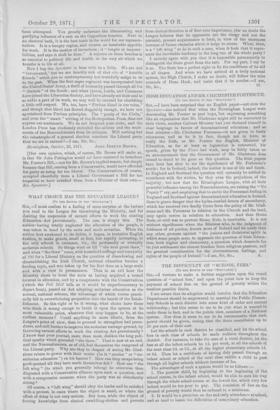IRISH EDUCATION AND MR. CHICHESTER FORTESCUE.
[To THE EDITOR OF THE "SPECTATOR,"] Sra,---I have been surprised that no English paper—not even the Spectator—has noticed that when the Birmingham League were denouncing Mr. Forster as past hope, but expressing something like an expectation that Mr. Gladstone might still be converted to their views, another Cabinet Minister had just declared himself in clear language iu favour of denominational education ; and as that minister —Mr. Chichester Fortescue—is not given to hasty utterances, and as he is in fact, though not in form, as really the Irish, as Mr. Forster the English, Minister of Education, as far at least as legislation is concerned, his speech, given by the Times last week, may be fairly taken as an announcement that the Government of Mr. Gladstone does intend to stand to its guns on this question. The Irish papers have been less slow to see the significance of Mr. Fortescue's words ; for to Ireland, indeed, the matter is one of life and death. In England and Scotland the question will certainly be settled in accordance with the wishes, be they even the prejudices, of the majority ; but now that the Birmingham League, with all their powerful influence among the Nonconformists, are raising the "No Popery 1" cry, and employing that to excite the Protestant feeling in England and Scotland against denominational education in Ireland, there is grave danger that the hydra-headed demon of ascendancy, which has received two deadly blows from the policy of Mr. Glad- stone and Mr. Fortescue in relation to the Church and the land, may again revive in relation to education. And then Home Rule, or civil war to prevent Home Rule, is inevitable. It is not without significance when the Minister who, in the judgment of Irishmen of all parties, knows more of Ireland and its needs than any other, protests against " the jealous and dictatorial spirit in which some people seem to approach the question of Irish Educa- tion, both higher and elementary, a question which demands for its just settlement the utmost freedom from religious passions, and the greatest consideration for the circumstances, feelings, and
rights of the people of Ireland."—I am, Sir, &c., A.


































 Previous page
Previous page